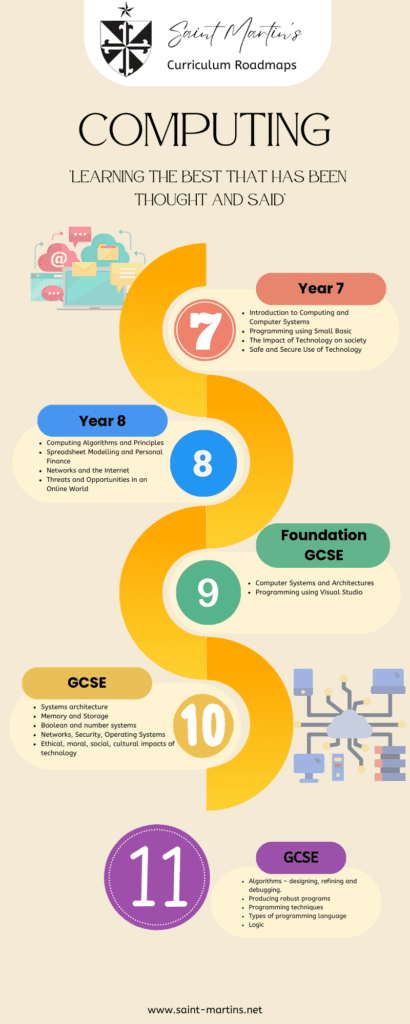Computer Science
There is currently a huge shortage of computing literate workers in our country and the demand for employees with programming, development and computer aided design skills is only growing. It has never been more important for students to be equipped with the skills necessary to meet this demand.
The Computer Science department aims to provide clear pathways for students to build the skills necessary to progress and develop a love of learning about technology from Year 7 to GCSE and beyond. Our curriculum is designed to be diverse, current, relevant, engaging and accessible to all.
Future Career Progression:
An understanding of Computing and Computer Science is essential to so many potential career pathways that they would be too long to list here. There are, of course, the obvious routes into further study of computing, for example:
- Computer Science degree
- Games designer
- Cyber security researcher
- Programmer / App designer
- Web developer
- Digital forensics / police investigation work
Outside of pure Computer Science, a qualification in this subject would help in careers based around:
- Engineering
- Product design
- Financial services or investment banking
- Renewable energy
- TV, Film and Media
- Medical research and development

KS3
At KS3, students cover a broad range of themes such as the impact of technology on society, right to repair laws, online safety and security, to the more traditional computing topics such as programming, networking, logic and data representation. Students learn a range of practical, analytical, research and problem solving skills across Year 7 and 8.
GCSE:
The OCR GCSE Computer Science course is the de facto standard in computing at GCSE level. The course is designed to give students a broad and robust foundation in computational skills and knowledge. Those taking the GCSE will be in the perfect position to begin to specialise their study of computing at college, on an apprenticeship or even in the workplace. Students learn about how a computer works, down to the circuit level, and how simple logic based on yes or no decisions can be combined to create unimaginably powerful systems.
There are a broad range of topics to study including:
- Networks and how the internet works
- The history of computing and how computers are designed
- Legal, moral and ethical issues surrounding the use of computers
- Logic and number systems
- How data is stored, transmitted and converted from real world form into something a computer can process and understand
- Computer programming
There are two exams that assess all topics in the GCSE, both 1 hour and 30 minutes each.
We provide extensive support to our students through detailed, bespoke knowledge booklets, a revision website which also contains all lesson materials, tutorial videos and more.
Year 7: Sample scheme of work – CLICK HERE
Year 10: Sample scheme of work – CLICK HERE

